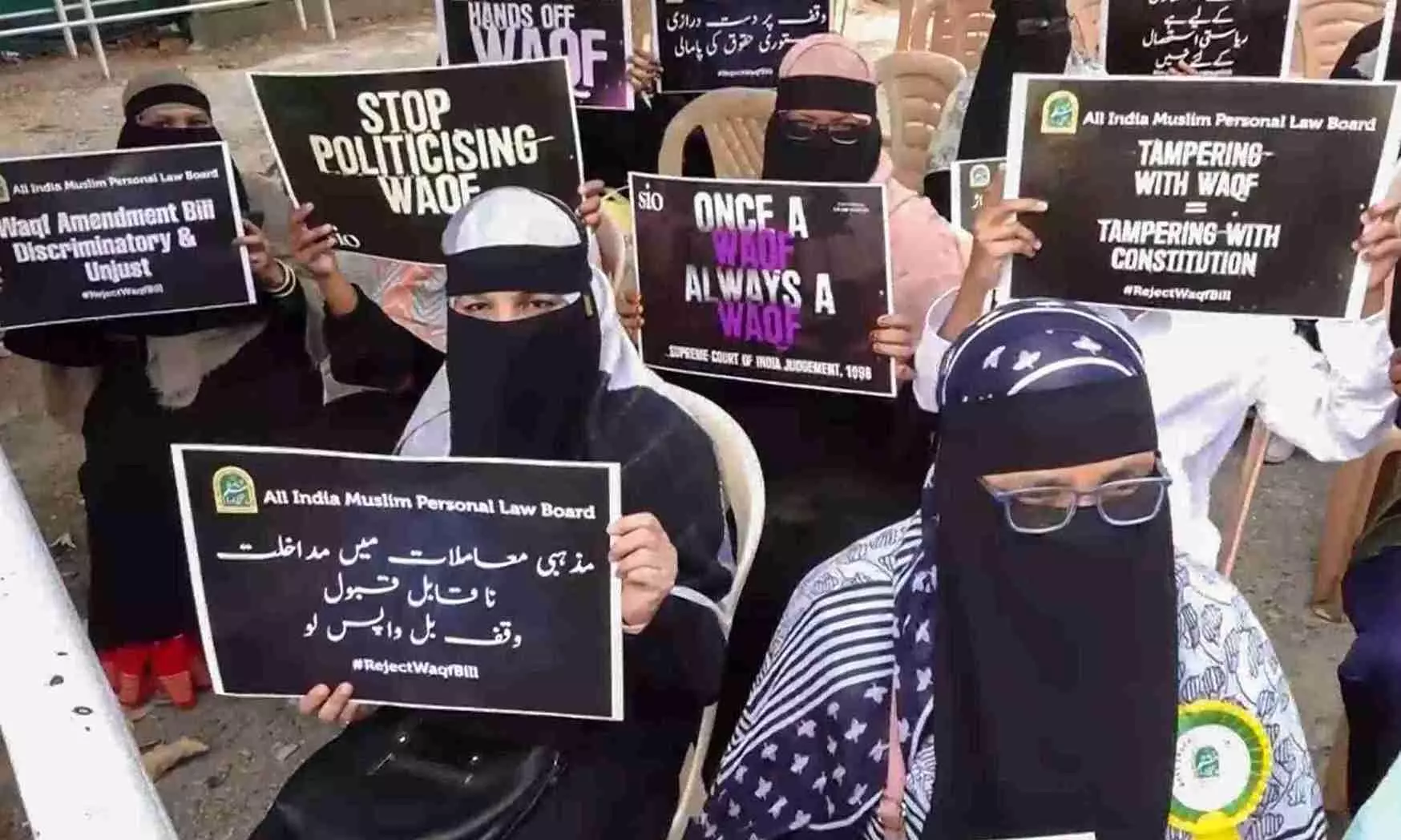
'Religious, social and political blow': What Urdu media says about Waqf Bill
The dailies paint a picture of a community on edge, a media landscape buzzing with debate, and a political battle that could reshape India’s minority landscape

The Urdu media in India sees the Waqf (Amendment) Bill passed inParliament as a threat to religious autonomy, minority rights and cultural heritage.
Newspapers like Roznama Hindustan, Rashtriya Sahara and Urdu Times, dissecting its implications for the Muslim community, have voiced concern and criticism. Qaumi Bharat adds its voice to the chorus.
Introduced on April 2, the bill seeks to expand government control over Waqf properties.
Urdu media’s charge
Notably, the Inquilab newspaper has remained silent. opting not to publish an editorial on this critical matter, leaving a curious gap in its coverage of this issue.
Roznama Hindustan leads the charge, declaring in a front-page analysis: “This bill, under the guise of reform, could weaken Waqf boards’ autonomy, allowing the government to reassess and redirect properties worth billions for ‘other purposes.’ It risks dismantling institutions like mosques, madrasas and orphanages that have served the community for centuries.”
The paper warns that such moves could erode the Muslim community’s religious and cultural identity, sparking fears of government overreach.
Also Read: Why Congress risks losing ground in Kerala despite opposing Waqf bill
Concern over Waqf assets
Rashtriya Sahara echoes this alarm, framing the bill as a potential “economic and social blow” to Muslims.
In a detailed report, it states: “The amendments could enable the government to use Waqf assets for non-charitable purposes, which political analysts see as a strategy to marginalize the community further. This is not reform but a calculated attack on minority rights.”
The newspaper also highlights opposition from Muslim organizations and political parties, who view the bill as a violation of constitutional guarantees.
Meant to divert
Urdu Times, however, takes a broader view, linking the bill’s timing to global political currents. Its editorial asserts: “Why was this bill rushed on April 2? While international media exposes America’s tariff shocks and political maneuvers, Indian media is distracted by this debate, possibly to shield the government from scrutiny over its failures.”
Also Read: UP has most Waqf properties in India; graveyards, mosques take most space
The paper suggests that the Bharatiya Janata Party (BJP) might be using the bill as a political tool, raising questions about transparency and intent.
On non-Muslims
Qaumi Bharat, while also critical, zeroes in on specific provisions, particularly the one allowing government intervention in ownership disputes over Waqf properties.
Its editorial cautions: “Granting the government authority to determine ownership in such cases could lead to unjust outcomes and the loss of legitimate community assets, depriving Muslims of their rightful heritage and resources. This is a dangerous precedent that threatens the very foundation of Waqf autonomy.”
The newspaper also slams other clauses, like allowing non-Muslims on Waqf boards and empowering district collectors, calling them steps toward “state control over religious affairs”.
Rijiju fails to sway
The government’s defence, as reported across these papers, comes from Union minority affairs minister Kiren Rijiju who argues: “This bill aims to eliminate corruption and ensure efficient management of Waqf properties. It’s about transparency, not targeting any community.”
But this stance has done little to quell the Urdu press’ scepticism.
Roznama Hindustan counters: “If the goal is transparency, why strip Waqf boards of their decision-making power? This smells of political agenda.”
Assault on constitution
Rashtriya Sahara adds: “Muslims see this as an assault on their constitutional rights under Articles 25, 26 and 29, which protect religious freedom and minority autonomy.”
Urdu Times, ever the provocateur, questions the broader context: “Is this bill a diversion from economic woes or governance failures? The timing, coinciding with global political shifts like Trump’s tariffs, suggests a deliberate strategy to shift focus.”
The paper’s coverage blends local outrage with international parallels, creating a narrative of state overreach on a global stage.
Silent Inquilab
In contrast, Inquilab’s silence is deafening. Unlike its peers, the newspaper has not published any editorial or in-depth analysis, leaving readers and analysts puzzled.
Industry sources speculate it might be due to internal pressures or strategic caution. This absence stands out, especially given Inquilab’s historical role as a voice for Muslim concerns.
Waqf ownership
Qaumi Bharat delivers a sharp critique, emphasizing the bill’s potential to disrupt Waqf ownership.
Its editorial warns: “The provision on ownership disputes is particularly alarming. It could see government officials arbitrarily deciding the fate of properties, leading to losses that could haunt the community for generations.”
Also Read: Catholic bishops' outfit backs Waqf Amendment Bill
The paper calls for legal challenges and public resistance, urging unity against what it calls “a threat to religious and cultural survival”.
Muslims on edge
Together, these newspapers paint a picture of a community on edge, a media landscape buzzing with debate, and a political battle that could reshape India’s minority landscape.
Roznama Hindustan predicts protests and legal battles, Rashtriya Sahara foresees long-term economic and social damage while Urdu Times frames it as part of a global pattern of state overreach.
Battleground Urdu media
Qaumi Bharat, meanwhile, focuses on the granular dangers, while Inquilab’s silence leaves a void that only amplifies the urgency of the others.
The Urdu press remains a critical battleground, amplifying Muslim fears and challenging the government’s narrative. As Roznama Hindustan underlines: “This bill isn’t just about property -- it’s about the soul of a community.”
